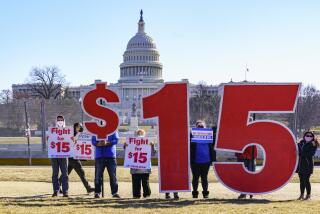Minimum wage and the cost of labor

- Share via
In their Op-Ed article Sunday, economists Kevin A. Hassett and Michael R. Strain said President Obama’s proposal to boost the federal minimum wage to $9 an hour would do little to blunt poverty in the United States and would make it more difficult for businesses to hire workers. They said other ways to aid the poor, including expanding the earned income tax credit, would be more effective. In response, reader Ralph Mitchell wrote:
“By opposing the president’s proposed minimum-wage increase to $9 an hour, Hassett and Strain are suggesting the government underwrite the cost of doing business by providing necessary life supports to families — through welfare systems, emergency healthcare, the earned income tax credit and so on — so that businesses can pay lower wages.
“If working wages provided enough income to raise families out of poverty, then we taxpayers wouldn’t have to foot the tax bill for family necessities. In other words, lower wages mean more government support for citizens while businesses get to maximize their profits.
“We should be careful supporting businesses that can’t operate without paying decent wages. They shouldn’t be welfare recipients.”
Kevin A. Hassett and Michael R. Strain respond:
As a general matter, government aid to the poor does not underwrite the cost of doing business. In fact, many recipients of federal aid to the poor do not work at all.
Broadly speaking, wages are determined by the supply of and the demand for labor, and are not determined based on the cost of supporting a family. A worker’s pay is equal to the marginal value he provides to his employing firm. Generally speaking, it is not the proper role of the government to determine which wages are acceptable and which are not.
It is reasonable that some workers would not provide enough marginal value to their firms to receive compensation sufficient to support a family. As examples, consider teenagers working summer jobs at grocery stores, or spouses working part-time jobs at retail stores, or low-skill workers trying to gain skills to move up the job ladder.
Government should not force firms to pay all workers enough to support families. If it did, then the teenagers and spouses and low-skill workers above would have no jobs, and both they and the firms that would like to employ them in the absence of the government-imposed wage would be made worse off.
In that world, there would be many more welfare recipients than there are today.
ALSO:
Letters: American values and the use of drones
More to Read
A cure for the common opinion
Get thought-provoking perspectives with our weekly newsletter.
You may occasionally receive promotional content from the Los Angeles Times.









